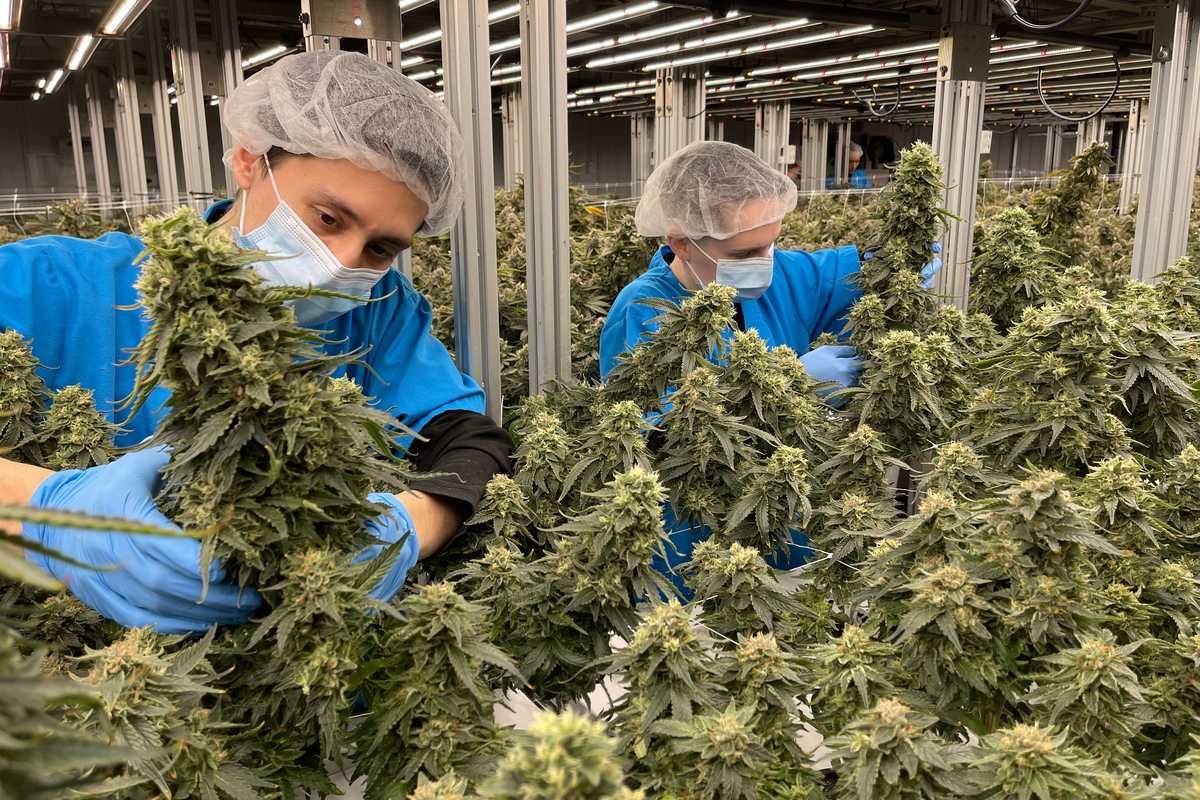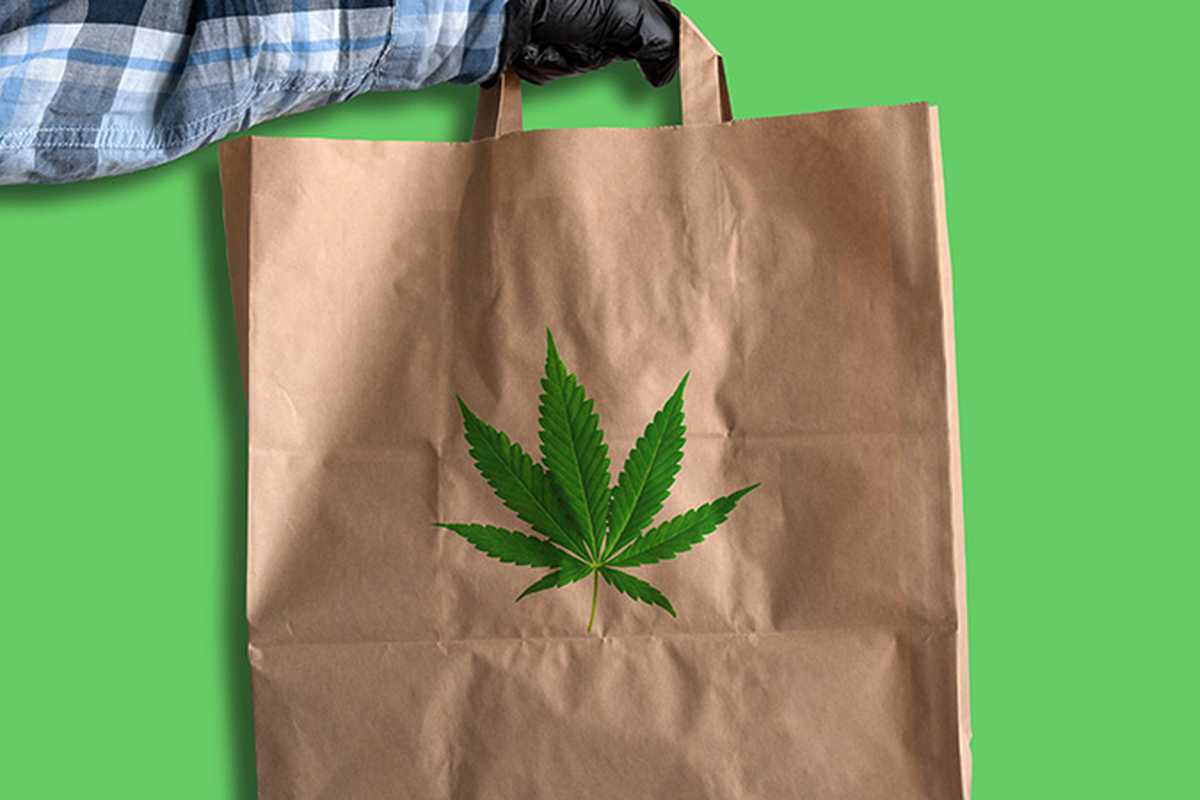Navigating Canadian cannabis retail standards for CBD oil Canada demands meticulous attention to regulatory compliance and operational excellence. Since the Cannabis Act’s implementation in 2018, retailers must navigate a complex framework of federal oversight and provincial variations in CBD oil sales. Health Canada’s strict quality control requirements, coupled with provincial-specific licensing protocols, create a rigorous but navigable pathway for legitimate retailers. This regulatory landscape, while challenging, provides a structured foundation for businesses to operate legally and safely in Canada’s growing cannabis market.
The current regulatory framework requires retailers to maintain detailed documentation of product sourcing, implement robust age verification systems, and adhere to specific storage and handling protocols. These requirements, though demanding, ultimately protect both consumers and businesses while fostering industry legitimacy. As the market continues to evolve, staying informed about regulatory updates and compliance requirements remains crucial for retail success in Canada’s CBD oil sector.
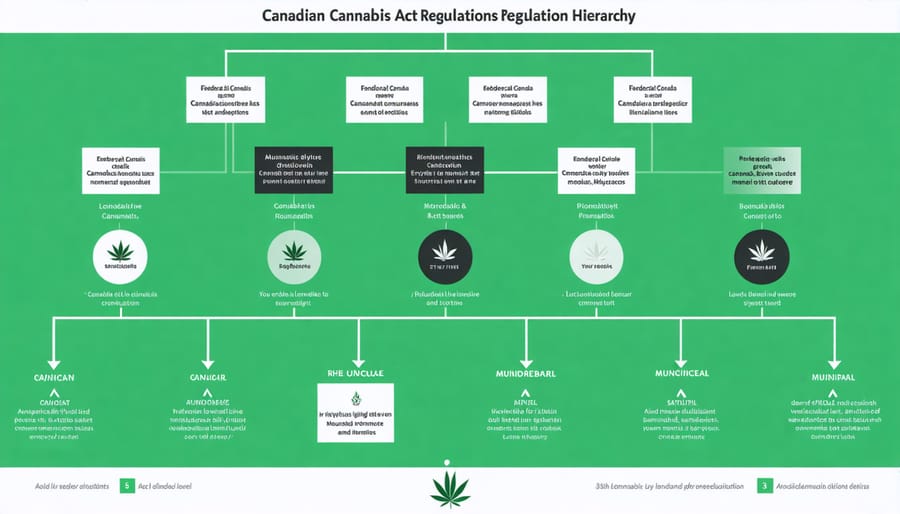
Federal Regulatory Framework for CBD Oil
Cannabis Act Requirements
Under the Cannabis Act, retailers must adhere to strict requirements when selling CBD oil products. All CBD oil products must come from licensed producers and comply with cannabis authorization guidelines established by Health Canada. Products must be sold in their original, sealed packaging with mandatory health warnings, THC and CBD content clearly displayed, and standardized cannabis symbols.
Retailers must maintain detailed inventory records and implement robust age verification systems to prevent sales to minors. The Act prohibits any health claims or therapeutic benefits in marketing materials, and retailers cannot promote CBD oil products through testimonials or endorsements. Storage requirements mandate that CBD oil products be kept in secure, temperature-controlled environments accessible only to authorized personnel.
Staff training is mandatory and must cover product knowledge, compliance requirements, and responsible sale practices. Retailers must also maintain documentation of their due diligence processes, including staff certification records and incident reports. The Act requires implementation of recall procedures and immediate reporting of any adverse events or product quality issues to Health Canada.
Additionally, retailers must comply with provincial variations in packaging, display, and sale restrictions while maintaining federal compliance. Regular audits and inspections ensure ongoing adherence to these requirements, with significant penalties for non-compliance.
Health Canada Guidelines
Health Canada maintains strict guidelines for CBD oil products in the legal cannabis market. All CBD oil products must undergo rigorous quality control testing and meet specific requirements before receiving approval for sale. These guidelines encompass several key areas including product composition, packaging, labeling, and testing protocols.
For composition requirements, CBD oil products must contain no more than 0.3% THC content, and manufacturers must accurately declare both CBD and THC concentrations. The guidelines mandate that products be free from harmful contaminants, including pesticides, heavy metals, and microbial growth.
Packaging regulations require child-resistant containers and tamper-evident seals. Labels must display standardized cannabis symbols, health warnings, and specific product information including:
– THC and CBD content
– Product lot number
– Packaging date
– Expiry date
– Licensed producer information
– Intended use instructions
Quality assurance requirements include regular laboratory testing by accredited facilities to verify cannabinoid content and ensure product safety. Manufacturers must maintain detailed records of testing results and implement Good Production Practices (GPP).
Health Canada also requires that all CBD oil products undergo stability testing to determine appropriate shelf life and storage conditions. Licensed producers must report any adverse reactions to Health Canada and maintain comprehensive product recall procedures as part of their compliance obligations.
These guidelines are regularly reviewed and updated to reflect new research and emerging industry standards, ensuring consumer safety remains paramount in the Canadian cannabis market.
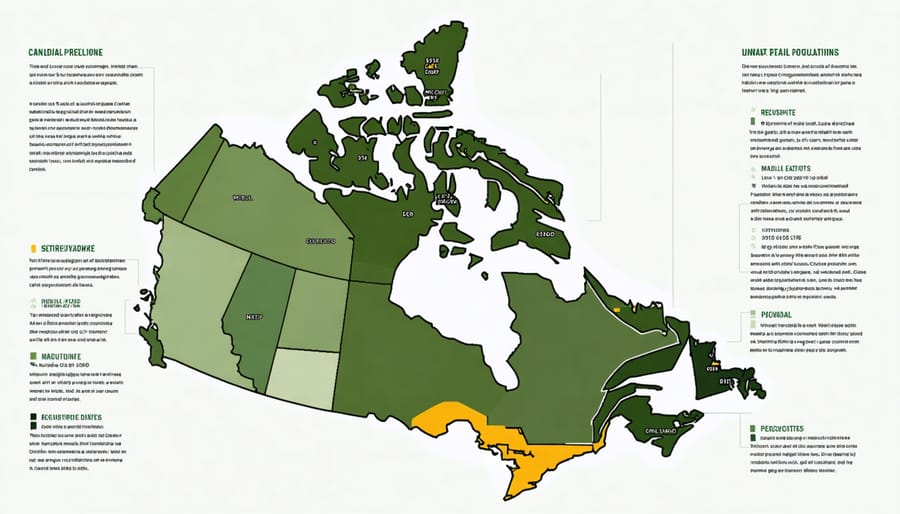
Provincial Regulations and Variations
License Requirements by Province
Each Canadian province maintains distinct licensing requirements for CBD oil retailers, reflecting regional priorities and market conditions. In British Columbia, retailers must obtain both a provincial retail license through the Liquor and Cannabis Regulation Branch (LCRB) and municipal approval. Alberta offers a streamlined process through Alberta Gaming, Liquor and Cannabis (AGLC), requiring mandatory staff training and security clearances.
Ontario operates through the Alcohol and Gaming Commission of Ontario (AGCO), mandating Retail Operator Licenses (ROL) and Retail Store Authorizations (RSA) for each location. Quebec’s more restrictive approach allows CBD oil sales exclusively through the Société québécoise du cannabis (SQDC), limiting private retail opportunities.
Maritime provinces vary in their approaches: Nova Scotia controls sales through the NSLC, while New Brunswick operates through Cannabis NB. Prince Edward Island maintains government-operated stores exclusively. Manitoba and Saskatchewan offer private retail opportunities but require strict security protocols and financial capability demonstrations.
The Northwest Territories, Yukon, and Nunavut each operate under territorial frameworks, typically combining government-operated stores with limited private retail options. Prospective retailers should note that licensing fees, renewal requirements, and processing times vary significantly by province, ranging from several weeks to many months. Regular compliance audits and ongoing staff certification requirements are standard across all jurisdictions.
Sales and Distribution Rules
Sales and distribution rules for CBD oil vary significantly across Canadian provinces, with each jurisdiction maintaining distinct regulatory frameworks. Retailers must obtain proper licensing through their provincial authorities before operating, and these licenses are typically separate from those required for other cannabis retail locations.
In Ontario, retailers must complete mandatory training through the CannSell certification program, while British Columbia requires the Selling It Right certification. Alberta maintains some of the most liberal policies, allowing private retailers to operate with minimal restrictions beyond federal requirements. Quebec, conversely, restricts CBD oil sales to government-operated stores through the Société québécoise du cannabis (SQDC).
Most provinces mandate specific storage requirements, including temperature-controlled environments and secure display cases. Online sales regulations also differ, with some provinces restricting e-commerce to government-operated platforms while others permit licensed private retailers to sell online within provincial boundaries.
Retailers must verify customer age (minimum 19 years in most provinces, 21 in Quebec) and maintain detailed transaction records. Product display restrictions are universal, requiring CBD oils to be kept out of public view and accessed only by authorized staff. Maximum purchase quantities apply, though these vary by province and product concentration.
Compliance Requirements for Retailers
Product Testing and Quality Standards
All CBD oil products sold in Canadian cannabis retail must undergo rigorous testing and meet strict quality control standards established by Health Canada. Licensed producers are required to conduct comprehensive laboratory testing for potency, contaminants, and product stability before their products can reach retail shelves.
Testing requirements include analysis for cannabinoid content, specifically CBD and THC levels, which must be accurately labeled on products. Products must also be screened for harmful contaminants including pesticides, heavy metals, microbial growth, and residual solvents. The acceptable limits for these contaminants are clearly defined in the Cannabis Regulations.
Quality assurance programs are mandatory for all licensed producers, who must employ qualified personnel to oversee testing processes. These programs must include detailed documentation of production methods, testing procedures, and quality control measures. Regular facility inspections ensure compliance with Good Production Practices (GPP).
Retailers must verify that all CBD oil products they stock come with certificates of analysis from accredited laboratories. These certificates confirm that products meet federal quality standards and contain accurate CBD concentrations. Products failing to meet these standards cannot be legally sold in Canadian retail establishments.
Record-keeping requirements mandate that retailers maintain documentation of product testing results and quality assurance measures for a minimum of two years, ensuring traceability and accountability throughout the supply chain.
Packaging and Labeling Requirements
In Canada, CBD oil products must adhere to strict packaging and labeling requirements established by Health Canada. All packaging must be plain, child-resistant, and tamper-evident to ensure product safety and prevent accidental consumption. The exterior must be a single, uniform color without any metallic or fluorescent finishes, and the surface cannot have any raised features, embossing, or special coatings.
Labels must prominently display the standardized cannabis symbol, mandatory health warnings, and THC/CBD content in both percentage and milligrams. Product labels are required to include the producer’s name, contact information, lot number, and packaging date. The packaging must also feature the excise stamp, which varies by province or territory, indicating that the product meets federal duty requirements.
Brand elements are strictly regulated, with limitations on font sizes, colors, and logo placement. Images and graphics are prohibited, except for the standardized cannabis symbol and excise stamp. Text must be in both English and French, following bilingual labeling requirements.
Product descriptions must be factual and cannot make health claims or use testimonials. The label must include proper storage instructions and the statement “Keep out of reach of children.” Retailers must ensure all CBD oil products in their inventory comply with these requirements before displaying them for sale.
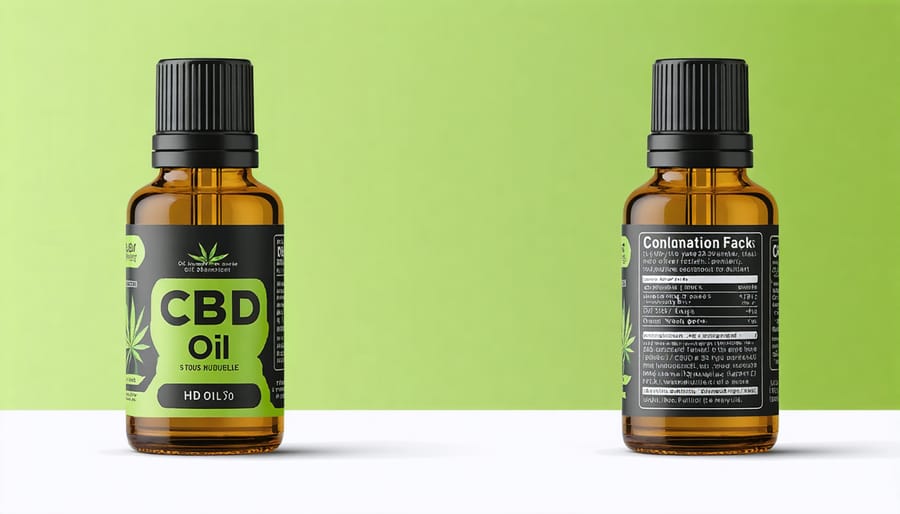
Record Keeping and Reporting
Canadian cannabis retailers must maintain comprehensive records of all CBD oil inventory, sales, and transactions in accordance with federal and provincial regulations. These records should include detailed information about product sourcing, batch numbers, quantities received and sold, and quality control documentation.
Daily sales records must be maintained for a minimum of two years and should include transaction dates, product details, quantities sold, and customer verification records. Retailers are required to use approved tracking systems that integrate with the Cannabis Tracking and Licensing System (CTLS) to report monthly sales data to Health Canada.
Security-related documentation, including surveillance footage and incident reports, must be preserved for at least one year. This documentation is essential for compliance with cannabis retail insurance requirements and regulatory audits.
Retailers must also maintain employee training records, standard operating procedures (SOPs), and documentation of any product recalls or adverse events. Regular internal audits should be conducted to ensure accuracy and completeness of all records.
Provincial licensing authorities may require additional reporting requirements, such as quarterly financial statements or annual compliance reports. It’s crucial to establish organized filing systems and implement digital record-keeping solutions to streamline these processes and ensure regulatory compliance.
All documentation must be readily accessible for inspection by regulatory authorities and should be stored securely to protect sensitive business information and customer privacy.
Future Outlook and Industry Impact
The Canadian CBD oil retail landscape is poised for significant evolution over the next few years. Industry experts anticipate several regulatory adjustments that will reshape how retailers operate and compete in the market. Health Canada’s ongoing review of the Cannabis Act suggests potential streamlining of licensing processes and modifications to CBD product categories by 2025.
A key anticipated change involves the potential reclassification of CBD as a natural health product, which would create new retail opportunities outside traditional cannabis stores. This shift could allow conventional pharmacies and health food stores to stock CBD products, fundamentally altering the competitive landscape for existing cannabis retailers.
Market analysts project substantial growth in the CBD sector, with estimates suggesting a compound annual growth rate of 16% through 2027. This growth trajectory is expected to create new employment opportunities, particularly in retail management, quality assurance, and compliance roles. Retailers should prepare for increased competition by focusing on staff training and customer education programs.
Provincial regulators are likely to introduce more standardized testing requirements for CBD products, potentially leading to higher operational costs but improved product consistency. Forward-thinking retailers should consider investing in advanced inventory management systems and quality control processes to meet these expected requirements.
The emergence of new product formats and delivery methods will likely prompt regulatory updates. Retailers should anticipate changes in storage requirements, display guidelines, and staff training protocols. Industry stakeholders suggest that future regulations may also address online sales platforms and delivery services more comprehensively.
To remain competitive, retailers must stay informed about pending regulatory changes and adapt their business models accordingly. This may include expanding product knowledge bases, upgrading point-of-sale systems, and developing more robust compliance documentation processes. Success in this evolving market will depend on retailers’ ability to balance regulatory compliance with customer service excellence while maintaining operational efficiency.
Navigating CBD oil regulations in Canadian cannabis retail requires diligent attention to compliance and ongoing education. Retailers must maintain current knowledge of federal and provincial requirements, including proper licensing, storage protocols, and product testing standards. Success in this evolving market depends on establishing robust compliance systems, maintaining detailed documentation, and investing in staff training. Regular audits of internal processes and staying informed about regulatory updates will help ensure continued compliance. For retailers looking to expand or enter the market, partnering with legal experts and industry consultants can provide valuable guidance. By prioritizing compliance and safety while adapting to changing regulations, retailers can build sustainable businesses that serve their communities effectively and maintain trust with both regulators and consumers.


